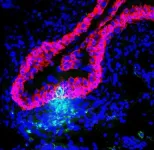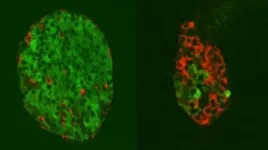Plant clock could be the key to producing more food for the world
Night time clock helps plants know when to grow
2021-03-01
(Press-News.org) A University of Melbourne led study has established how plants use their metabolism to tell time and know when to grow - a discovery that could help leverage growing crops in different environments, including different seasons, different latitudes or even in artificial environments and vertical gardens.
Published in the PNAS journal, Superoxide is promoted by sucrose and affects amplitude of circadian rhythms in the evening, details how plants use their metabolism to sense time at dusk and help conserve energy produced from sunlight during the day.
Lead researcher Dr Mike Haydon, from the School of BioSciences, said while plants don't sleep as humans do, their metabolism is adjusted during the night to conserve energy for the big day ahead of making their own food using energy from sunlight, or photosynthesis.
"Getting the timing of this daily cycle of metabolism right is really important because getting it wrong is detrimental to growth and survival," Dr Haydon said. "Plants can't stumble to the fridge in the middle of the night if they get hungry so they have to predict the length of the night so there's enough energy to last until sunrise; a bit like setting an alarm clock."
Dr Haydon and collaborators had earlier shown that the accumulation of sugars produced from photosynthesis give the plant important information about the amount of sugar generated in the morning and sends signals to what's known as the circadian clock, to adjust its pace.
"We have now found that a different metabolic signal, called superoxide, acts at dusk and changes the activity of circadian clock genes in the evening," said Dr Haydon. "We also found that this signal affects plant growth. We think this signal could be providing information to the plant about metabolic activity as the sun sets."
Researchers hope the study will be invaluable in the world producing more food, more reliably.
"As we strive to produce more food for the increasing global population in the face of changing climate, we may need to grow crops in different environments such as different seasons, different latitudes or even in artificial environments like vertical gardens," Dr Haydon said.
"Understanding how plants optimise rhythms of metabolism could be useful information to allow us to fine-tune their circadian clocks to suit these conditions and maximise future yields."
INFORMATION:
[Attachments] See images for this press release:

ELSE PRESS RELEASES FROM THIS DATE:
2021-03-01
DURHAM, N.C. - Anyone who has ever developed a urinary tract infection (UTI) knows that it can be painful, pesky and persistent. UTIs have a high recurrence rate and primarily afflict women -- as many as 50% of women will experience at least one UTI during their lifetime.
However, what if patients could take a vaccine that would prevent future UTIs? In a March 1 study in the Proceedings of the National Academy of Sciences, Duke researchers describe a new vaccination strategy that they think could re-program the body to fight off the bacteria that cause urinary tract infections.
"Although several vaccines against UTIs have been investigated in clinical trials, they have so far had limited success," said Soman Abraham, Ph.D., Grace Kerby Distinguished Professor of Pathology, Immunology ...
2021-03-01
A new study from Boston Children's Hospital and the Massachusetts Department of Health compared one of the latest rapid antigen tests for COVID-19 -- the Abbott BinaxNOW -- with a highly accurate PCR test in a high-volume, drive-thru testing environment. They found that the rapid test detected almost all adults who tested positive by PCR if they had had symptoms lasting seven days or less. In symptomatic children with less than seven days of symptoms, the test picked up about 85 percent of true positive cases.
But no matter the age, if the patient had high amounts of virus in their nose, the test caught it 99 percent of the time. It was also able to rule out COVID-19 ...
2021-03-01
The human gut consists of a complex community of microbes that consume and secrete hundreds of small molecules--a phenomenon called cross-feeding. However, it is challenging to study these processes experimentally. A new study, published in END ...
2021-03-01
Researchers from Skoltech and the University of Cambridge have shown that polaritons, the quirky particles that may end up running the quantum supercomputers of the future, can form structures behaving like molecules - and these "artificial molecules" can potentially be engineered on demand. The paper outlining these results was published in the journal Physical Review B Letters.
Polaritons are quantum particles that consist of a photon and an exciton, another quasiparticle, marrying light and matter in a curious union that opens up a multitude of possibilities in next-generation polaritonic devices. Alexander Johnston, Kirill Kalinin and Natalia Berloff, professor at the Skoltech Center for Photonics and Quantum Materials ...
2021-03-01
A group of researchers representing four countries summed up the results of the Supertest, a large-scale study of the academic performance of engineering students in Russia, China, India, and the United States. It is the first study to track the progress of students in computer science and electrical engineering over the course of their studies with regard to their abilities in physics, mathematics, and critical thinking and compare the results among four countries. The article about study in Nature Human Behavior.
The HSE Institute of Education played a key role not only in collecting and analyzing data from Russia, ...
2021-03-01
March 1, 2021 - Benign bone tumors may be present in nearly 20 percent of healthy children, based on a review of historical radiographs in The Journal of Bone & Joint Surgery. The journal is published in the Lippincott portfolio in partnership with Wolters Kluwer.
Although that may sound frightening, non-ossifying fibromas and other common benign bone tumors in symptom-free children are harmless and may resolve over time, reports the new study by Christopher D. Collier, MD, of Indiana University School of Medicine and colleagues. "These findings provide unique evidence to answer many commonly encountered questions when counseling patients and their families on benign bone tumors," the researchers write.
Study offers reassurance that benign ...
2021-03-01
Blocking cell receptors for glucagon, the counter-hormone to insulin, cured mouse models of diabetes by converting glucagon-producing cells into insulin producers instead, a team led by UT Southwestern reports in a new study. The END ...
2021-03-01
Boston, MA--Most pregnant women and mothers of children younger than 18 years old say they would receive a COVID-19 vaccine and vaccinate their children, according to a survey conducted by researchers at Harvard T.H. Chan School of Public Health. The research indicated that vaccine acceptance was highest in India, the Philippines, and all sampled countries in Latin America, and it was lowest in Russia, the U.S., and Australia.
The results will be published online on March 1, 2021 in the European Journal of Epidemiology.
Vaccines for COVID-19 are being distributed around the world, but until ...
2021-03-01
SILVER SPRING, Md. - A recent preclinical study by U.S. Military HIV Research Program (MHRP) researchers showed that an experimental therapy combining a TLR7 agonist and two broadly neutralizing antibodies delayed viral rebound in SHIV-infected macaques after antiretroviral therapy (ART) interruption.
The experimental combination therapy consisted of TLR7 agonist GS-986 and two broadly neutralizing antibodies (bnAbs), N6-LS and PGT121, targeting different regions of the HIV envelope. The rhesus macaques were initiated on viral suppressive antiretroviral therapy 14 days post infection, a timespan from infection to treatment which mirrors what is feasible in acute HIV infection. Researchers then administered the experimental combination ...
2021-03-01
NEW YORK, NY (March 1, 2021)--By harnessing the immune system against cancer, immunotherapies have revolutionized the way some types of cancer are treated. But most patients--across cancer types--do not respond, and in most cases, scientists are at a loss as to why.
Researchers at Columbia and MIT have created a new technique that can uncover nearly all of the tricks cancer cells use to evade immunotherapies, which could lead to the development of more effective treatments.
The researchers tested their new technique with cancer cells and matching immune cells from melanoma patients and identified previously unknown resistance mechanisms to immune checkpoint ...
LAST 30 PRESS RELEASES:
[Press-News.org] Plant clock could be the key to producing more food for the world
Night time clock helps plants know when to grow




